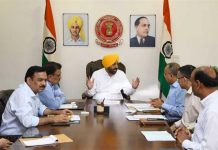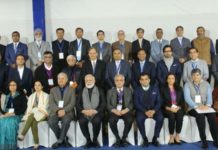Falahi and SIMI knew they had this coming. In fact, for more than a month, and especially since the September 11, 2001 terror attacks in the United States, Advani had stepped up a war of words against SIMI, and Falahi had aggressively duelled with the Home Minister. A month earlier, on August 20, Falahi had issued an angry press release — those were the days when the media provided space to SIMI’s views. Warning that Muslims wouldn’t “tolerate injustice and atrocities” anymore and would “fight a decisive battle for their rights,” Falahi said: “The increasing Islamic awakening has disturbed the Sangh Parivar as it considers SIMI the biggest obstacle in building the Ram temple at Ayodhya and making India a Hindu rashtra.”
Taking on the Home Minister, Falahi said Advani and the RSS were responsible for the demolition of the Babri Masjid at Ayodhya in 1992, and reminded Advani that his cross-country Rath Yatra in 1990 had triggered riots across India. “The government hasn’t been able to make out a case against SIMI and, therefore, false grounds are being prepared,” Falahi further said. He added: “Till date, not a single allegation against SIMI has been proved while the planned attacks of the Sangh Parivar against Christians, Dalits and Muslims have been exposed by various inquiry commissions.” Falahi’s reckless challenge to India’s Home Minister was not atypical. But that was perhaps the last media space Falahi got to exercise his Right to Speech.
On September 27, after the ban was announced, Falahi and three others stayed at the office awaiting the inevitable arrival of the police. Sure enough, a dozen policemen stormed the building shortly after midnight and arrested them. “They broke the door before we could open it,” Falahi told TEHELKA from his village in Azamgarh district of Uttar Pradesh where he lives and practices medicine. “They kicked us and abused us all the way to the police station.” The government said no fewer than 240 SIMI members, including Falahi, had been arrested in a nationwide crackdown.
THE NEXT day, the Union Home Secretary called a press conference and grandly claimed that SIMI had links with Osama bin Laden/Al Qaeda, and that Palestine’s guerrilla militia, Hamas, was its close ideological partner. “Anti-national” video and audio cassettes and other “propaganda material” were reportedly seized. SIMI activists had been allegedly found distributing pro-Taliban leaflets in Delhi and other cities. No details were given, then or later. In seven years, recovery of such material has become the standard in criminal cases against SIMI, without explaining how their content — like videos of Osama bin Laden and the US terror attacks, which are easily available on the Internet — links SIMI with terrorism.
Indeed, just a day into the ban, the government had launched the tactic of making unsubstantiated, vague and generic allegations against SIMI — a tactic that the police and the intelligence agencies have perfected against SIMI since 2001. In quite the manner prescribed by Nazi propaganda minister Joseph Goebbels, the government also took to repeating mere allegations so often that they began to be accepted as the truth without needing to pass the litmus test of evidence and proof. Typically, top ministers and police level allegations against SIMI, especially when there is a terrorist attack, and the news media play them up incessantly. Yet, no proof or evidence is ever offered from a public forum. What is offered as evidence in the judicial forum is a mockery of the principles of criminal investigation.
On that day, many such allegations against SIMI tumbled out. The Home Secretary said SIMI had printed “provocative” posters and issued press releases that “caused communal tensions”. No details were given of the communal tensions or the provocation in the posters. He said SIMI distributed posters and pamphlets across the country — again, no mention of what they contained and how that broke the law.











